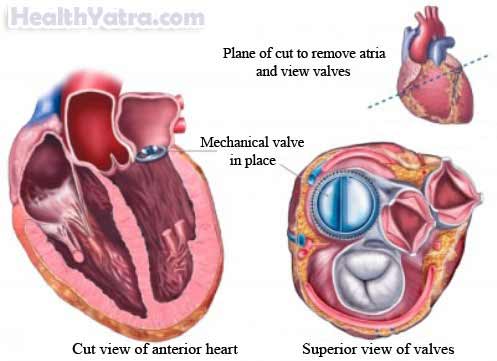تعريف
The mitral valve is on the left side of the heart. It allows blood to flow from the left upper chamber into the left lower chamber. When the valve is not working well, it may need to be replaced.
أسباب هذا الإجراء
Healthy heart valves allow blood to flow one way. Diseased valves either leak and cause back flow or narrow and restrict flow. The condition can be life-threatening. Sometimes the valve can be repaired. Other times, it must be replaced.
Rheumatic fever, infections, defects at birth, and wear and tear are the most common causes of mitral valve problems.
المضاعفات المحتملة
If you are planning to have a mitral valve replacement, your سيقوم الطبيب بمراجعة القائمة من المضاعفات المحتملة، والتي قد تشمل:
- نزيف
- العدوى
- Damage to the heart or other organs
- رد فعل للتخدير
The demands of عملية قلب مفتوح are severe. The better your general health, the less likely you will experience a complication. Some of the risk factors that must be evaluated before you undergo this procedure include:
- Smoking, which can increase your risk of complications
- مرض السكري
- Weight
- مرض قلبي
- اضطرابات تخثر الدم
- Cancer
ما يمكن توقعه
قبل الإجراء
Your doctor will evaluate both your general health and the condition of your heart and circulation. Expect several heart tests, including an electrocardiogram (EKG) and anechocardiogram using ultrasound. Some patients may also have cardiac catheterization.
المؤدية إلى الإجراء الخاص بك:
- Talk to your doctor about your medicines, herbs, or supplements. You may be asked to stop taking some medicines up to one week before the procedure, like:
- الأسبرين أو غيره من العقاقير المضادة للالتهابات
- Blood-thinning medicines
- Do not eat or drink anything the night before your procedure.
التخدير
You will have a general anesthetic. You will be asleep.
وصف الإجراء
An incision will be made along the length of your breast bone. The breast bone will be split lengthwise to expose your heart. You will then be put on a heart-lung machine. This machine takes over the work of your heart so that the doctor can stop your heart.
Your heart will be opened. A substitute valve will be sewn into place. This valve may be mechanical (metal and plastic), such as a St. Jude valve, or it may be made of tissue. Tissue valves most often come from a pig or a cow. Tissue valves may also be supplied by a human donor or even manufactured from your own tissues. When the valve is in place, you will be taken off of the heart-lung machine and your heart will be re-started. The incision will be closed.

Newer techniques, including robot-assisted procedures, are being developed. These procedures will be able to do the same surgery with smaller incisions.
مباشرة بعد الإجراء
You will be taken to a recovery room. You will be monitored for any negative reactions.
كم من الوقت سيستغرق ؟
حوالي 2-5 ساعات
كم هو مؤلم ؟
Anesthesia will block pain during the surgery. Your chest and back will be sore following the surgery. Talk to your doctor about medicine to help manage pain.
متوسط الإقامة في المستشفى
The usual length of stay is 8-10 days. Your doctor may choose to keep you longer if complications arise.
الرعاية ما بعد الجراحة
في المستشفى
You will probably spend 1-3 days in the intensive care unit (ICU) and several more days in a regular hospital room. During this time, your care team will:
- Observe you for any complications
- Stabilize your heart function
- Instruct you in home care and activities
في البيت
Be sure to follow your doctor’s instructions, which may include:
- If you have a mechanical valve, you will need to take blood thinners for life. This will help to prevent blood clots. If you have a tissue valve, you will need to take blood-thinning medicine for six weeks to three months after surgery.
- You may also need to take antibiotics during dental procedures and during certain other procedures. This will help prevent a valve infection.
- اسأل طبيبك حول, عندما هي آمنة للاستحمام, السباحة, أو نقع في الماء.
- You will slowly return to your usual activities over a 4-12 week period. You may also be asked to participate in a cardiac rehabilitation program.
Mechanical valves can last a lifetime. Tissue valves last 7-14 years and then must be replaced. If your valve is repaired and you have no complications, you will likely do well and be able to return to normal activities.
استدعاء الطبيب
بعد مغادرة المستشفى، اتصل بطبيبك في حالة حدوث أي مما يلي:
- علامات الإصابة, بما في ذلك حمى وقشعريرة
- احمرار أو تورم أو ألم متزايد أو نزيف شديد أو أي إفرازات من موقع الشق
- Constipation, diarrhea, bloody or tarry-color bowel movements, or stomach pain
- Weight gain—greater than two pounds in two days
- Worsening of ankle swelling
- صداع حاد
- الغثيان و/أو القيء
- السعال، ضيق التنفس، أو ألم في الصدر
- سعال الدم
- Skin rash, or unusual bruising or bleeding
- ارتباك
- Lightheadedness when standing
- Tingling in hands and feet
- Irregular heartbeat, extremely slow pulse, or fast pulse
- Redness, swelling, or pain in one or both legs
- Burning during urination
في حالة الطوارئ ، اتصل على المساعدة الطبية على الفور.
